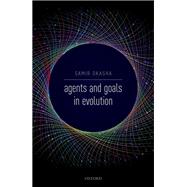Agents and Goals in Evolution
, by Okasha, Samir- ISBN: 9780192894434 | 0192894439
- Cover: Paperback
- Copyright: 1/8/2021
Samir Okasha approaches evolutionary biology from a philosophical perspective in Agents and Goals in Evolution, analysing a mode of thinking in biology called agential thinking. He considers how the paradigm case involves treating an evolved organism as if it were an agent pursuing a goal, such as survival or reproduction, and seeing its phenotypic traits as strategies for achieving that goal or furthering its biological interests.
As agential thinking deliberately transposes a set of concepts--goals, interests, strategies--from rational human agents and to the biological world more generally, Okasha's enquiry firstly looks at the justification for this: is it mere anthropomorphism, or does it play a genuine intellectual role in the science? From this central question, key points are considered such as: how do we identify the 'goal' that evolved organisms will behave as if they are trying to achieve? Can agential thinking ever be applied to groups rather than to individual organisms? And how does agential thinking relate to the controversies over fitness-maximization in evolutionary biology?
In addition, Okasha examines the relation between the adaptive and the rational by considering whether organisms can validly be treated as agent-like. Should we expect their evolved behaviour to correspond with that of rational agents as codified in the theory of rational choice? If so, does this mean that the fitness-maximizing paradigm of the evolutionary biologist can be mapped directly to the utility-maximizing paradigm of the rational choice theorist? All of these important questions are engagingly raised and discussed at length.
As agential thinking deliberately transposes a set of concepts--goals, interests, strategies--from rational human agents and to the biological world more generally, Okasha's enquiry firstly looks at the justification for this: is it mere anthropomorphism, or does it play a genuine intellectual role in the science? From this central question, key points are considered such as: how do we identify the 'goal' that evolved organisms will behave as if they are trying to achieve? Can agential thinking ever be applied to groups rather than to individual organisms? And how does agential thinking relate to the controversies over fitness-maximization in evolutionary biology?
In addition, Okasha examines the relation between the adaptive and the rational by considering whether organisms can validly be treated as agent-like. Should we expect their evolved behaviour to correspond with that of rational agents as codified in the theory of rational choice? If so, does this mean that the fitness-maximizing paradigm of the evolutionary biologist can be mapped directly to the utility-maximizing paradigm of the rational choice theorist? All of these important questions are engagingly raised and discussed at length.






